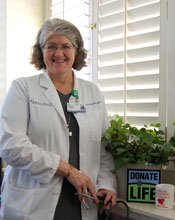When Dr. Shirley Schlessinger was a young medical student at Baylor Hospital in Dallas, an encounter with a patient who desperately needed a transplant became the catalyst for devoting her career to organ recovery.
"I came across the path of a young woman that after three pregnancies had become bed ridden from blood clots in her lungs," Schlessinger recalls. After visiting the patient daily, she knew that without a transplant, the woman would not survive.
"The interaction with that patient made me realize that transplants can either extend or save lives," she says.
"A transplant not only changes the lives of the patients, but it affects their caregivers as well. Parents are able to go back to work if ... they were the primary care giver. Siblings are 'reborn' with their brother or sister, and return to somewhat of a normal life. It is a very rewarding area of medicine to work in."
Schlessinger, 51, is the medical director and chairwoman for the Board for the Mississippi Organ Recovery Agency--one of 57 federally funded organ-recovery programs in the nation. She is the associate dean for graduate medical education, and interim chairwoman at the department of medicine and physician at the University of Mississippi Medical Center. She is also one of the organizers of the Global Obesity Summit at the Jackson Convention Center Nov. 9 through 11. The event will draw international scientist, clinicians, businesses leaders and policy makers to discuss solutions to obesity.
"I am wearing way too many hats, it seems," she says, laughing.
Schlessinger earned her doctorate from Louisiana State University School of Medicine in New Orleans and moved to Jackson in 1985 with her husband, Louis, to study internal medicine. She left briefly for a stint in Birmingham to learn nephrology, the study of kidney diseases. She moved back in Jackson in 1993 for her current position at MORA.
Currently, about 200 people in Mississippi are on the waiting list for kidneys, and 500 patients are waiting lists for other organs.
"Mississippians are giving and kind people, and although the actual number of confirmed donors is low, overall 60 to 70 percent of donors whose organs can be donated, either they agreed, or in the case of death, the family agreed for them to be donated," she stated
Schlessinger lives in Ridgeland with her husband, son, Drew, 18, and daughter, Allie, 14. She says she has seen Jackson grow and make tremendous progress over the past 25 years, which has increased opportunities for UMMC to prosper. At the end of the day, Schlessinger says working with people is what she enjoys most about her job.
"I still really enjoy my role as a physician," she says. "The best day of the week is when I get to see patients."



Comments
Use the comment form below to begin a discussion about this content.
comments powered by Disqus